Organisational Culture and Motivation at Uber: A Critical Analysis
VerifiedAdded on 2023/01/06
|21
|2891
|63
Report
AI Summary
This report provides a comprehensive analysis of Uber's organizational culture and its impact on workforce motivation and team behavior. It begins with an introduction to Uber, outlining its mission, vision, and aims. The report then critically evaluates the relationship between culture, power, and politics within Uber, examining how these factors have influenced team behavior in the past and present. It delves into the influence of power and politics, discussing the cultures being developed within the company. Furthermore, the report explains content and process theories of motivation, such as Herzberg's and Vroom's theories, and evaluates how these, along with other motivational techniques, can improve team effectiveness within Uber. The analysis explores how improved motivation levels can help Uber achieve its organizational goals, offering justified recommendations. The report concludes with a summary of findings and a list of references.
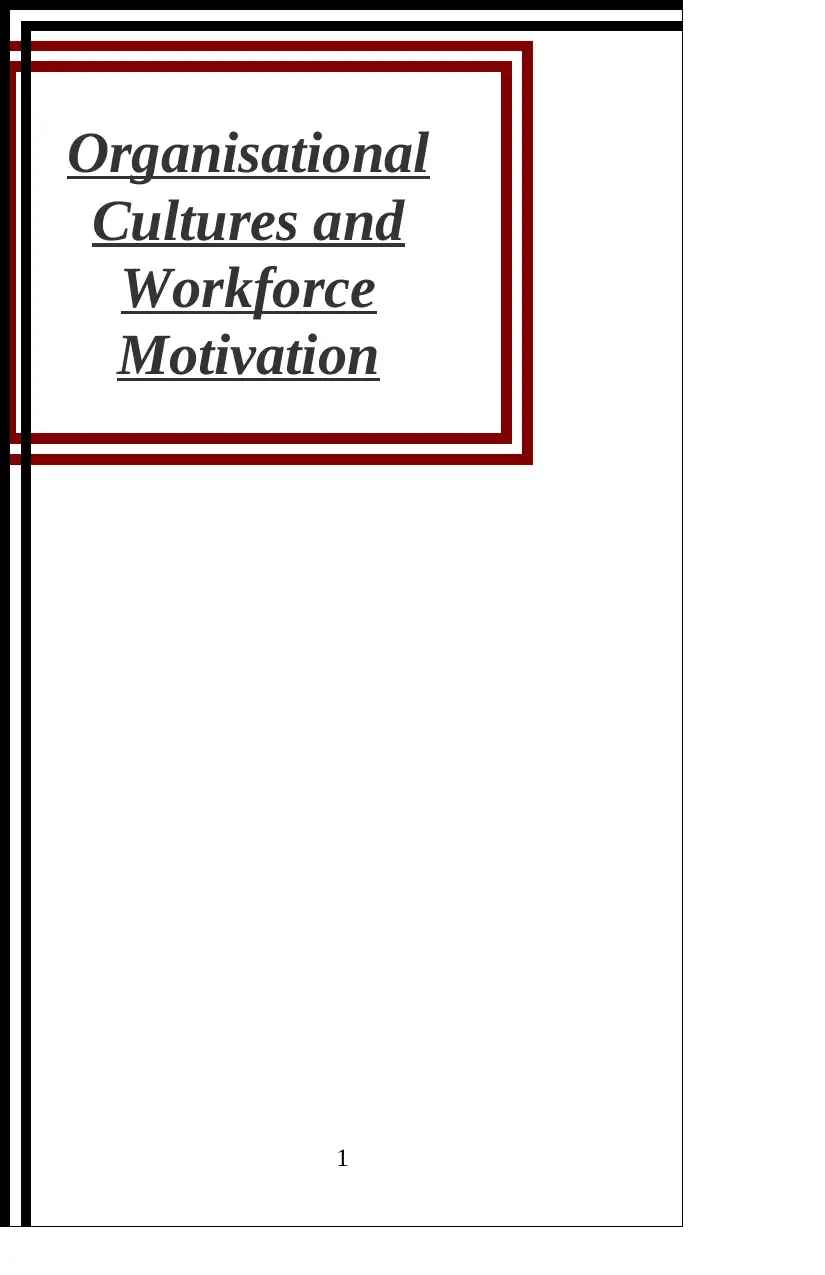
Organisational
Cultures and
Workforce
Motivation
1
Cultures and
Workforce
Motivation
1
Paraphrase This Document
Need a fresh take? Get an instant paraphrase of this document with our AI Paraphraser
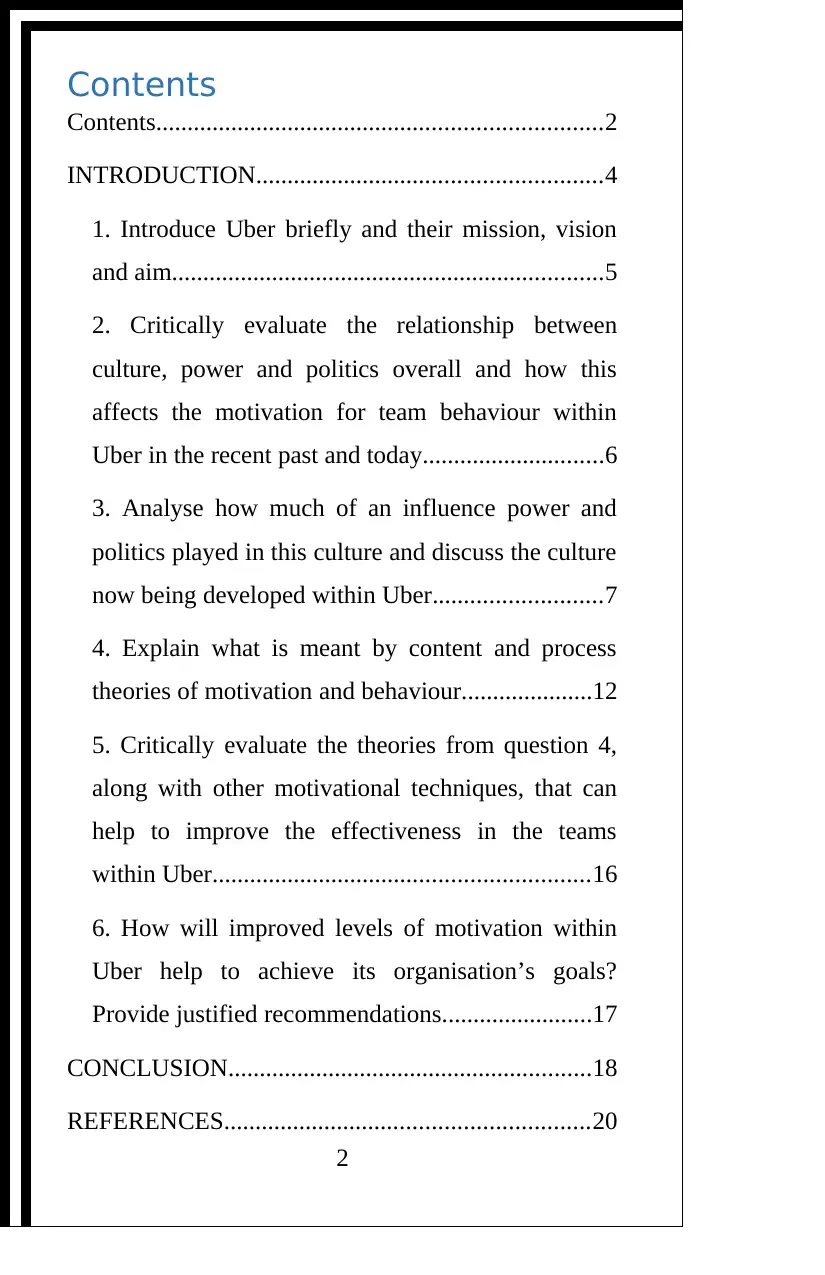
Contents
Contents.......................................................................2
INTRODUCTION.......................................................4
1. Introduce Uber briefly and their mission, vision
and aim.....................................................................5
2. Critically evaluate the relationship between
culture, power and politics overall and how this
affects the motivation for team behaviour within
Uber in the recent past and today.............................6
3. Analyse how much of an influence power and
politics played in this culture and discuss the culture
now being developed within Uber...........................7
4. Explain what is meant by content and process
theories of motivation and behaviour.....................12
5. Critically evaluate the theories from question 4,
along with other motivational techniques, that can
help to improve the effectiveness in the teams
within Uber............................................................16
6. How will improved levels of motivation within
Uber help to achieve its organisation’s goals?
Provide justified recommendations........................17
CONCLUSION..........................................................18
REFERENCES..........................................................20
2
Contents.......................................................................2
INTRODUCTION.......................................................4
1. Introduce Uber briefly and their mission, vision
and aim.....................................................................5
2. Critically evaluate the relationship between
culture, power and politics overall and how this
affects the motivation for team behaviour within
Uber in the recent past and today.............................6
3. Analyse how much of an influence power and
politics played in this culture and discuss the culture
now being developed within Uber...........................7
4. Explain what is meant by content and process
theories of motivation and behaviour.....................12
5. Critically evaluate the theories from question 4,
along with other motivational techniques, that can
help to improve the effectiveness in the teams
within Uber............................................................16
6. How will improved levels of motivation within
Uber help to achieve its organisation’s goals?
Provide justified recommendations........................17
CONCLUSION..........................................................18
REFERENCES..........................................................20
2
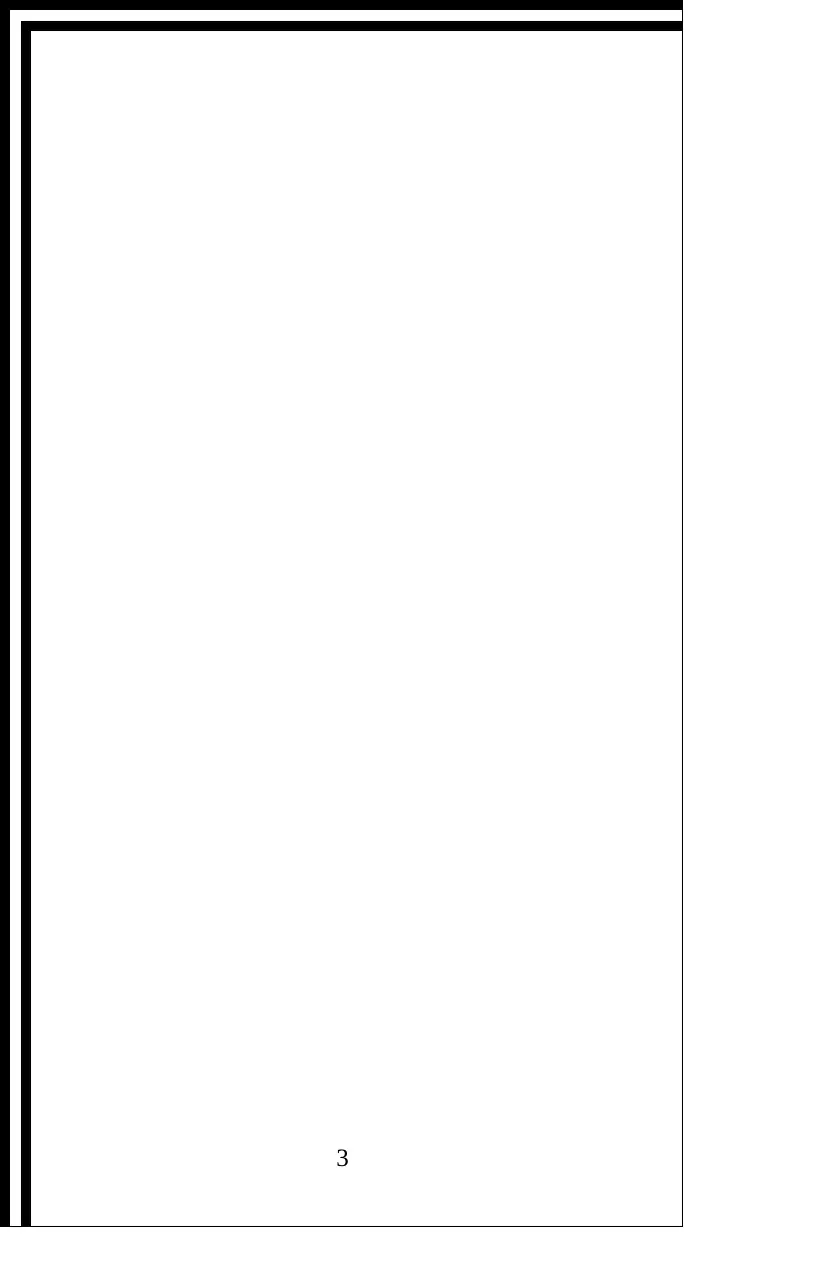
3
⊘ This is a preview!⊘
Do you want full access?
Subscribe today to unlock all pages.

Trusted by 1+ million students worldwide
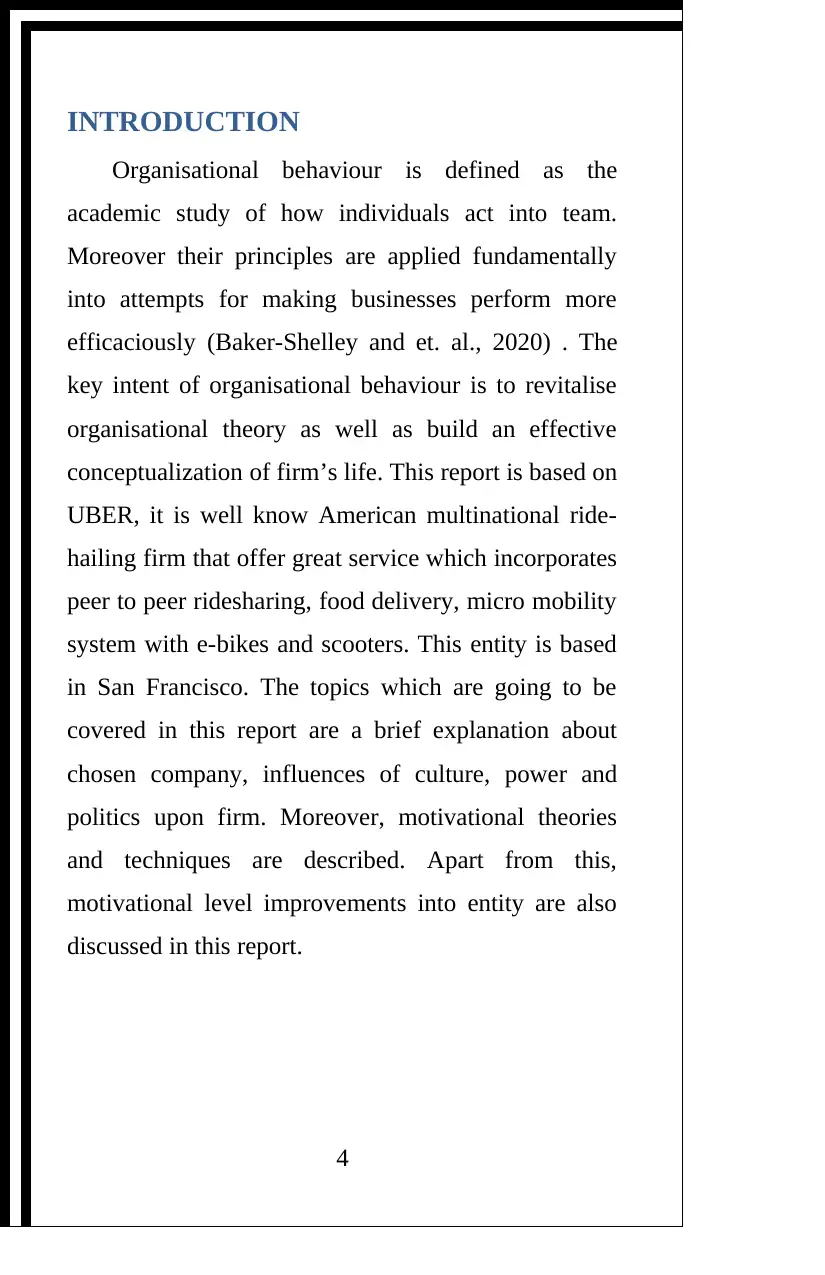
INTRODUCTION
Organisational behaviour is defined as the
academic study of how individuals act into team.
Moreover their principles are applied fundamentally
into attempts for making businesses perform more
efficaciously (Baker-Shelley and et. al., 2020) . The
key intent of organisational behaviour is to revitalise
organisational theory as well as build an effective
conceptualization of firm’s life. This report is based on
UBER, it is well know American multinational ride-
hailing firm that offer great service which incorporates
peer to peer ridesharing, food delivery, micro mobility
system with e-bikes and scooters. This entity is based
in San Francisco. The topics which are going to be
covered in this report are a brief explanation about
chosen company, influences of culture, power and
politics upon firm. Moreover, motivational theories
and techniques are described. Apart from this,
motivational level improvements into entity are also
discussed in this report.
4
Organisational behaviour is defined as the
academic study of how individuals act into team.
Moreover their principles are applied fundamentally
into attempts for making businesses perform more
efficaciously (Baker-Shelley and et. al., 2020) . The
key intent of organisational behaviour is to revitalise
organisational theory as well as build an effective
conceptualization of firm’s life. This report is based on
UBER, it is well know American multinational ride-
hailing firm that offer great service which incorporates
peer to peer ridesharing, food delivery, micro mobility
system with e-bikes and scooters. This entity is based
in San Francisco. The topics which are going to be
covered in this report are a brief explanation about
chosen company, influences of culture, power and
politics upon firm. Moreover, motivational theories
and techniques are described. Apart from this,
motivational level improvements into entity are also
discussed in this report.
4
Paraphrase This Document
Need a fresh take? Get an instant paraphrase of this document with our AI Paraphraser
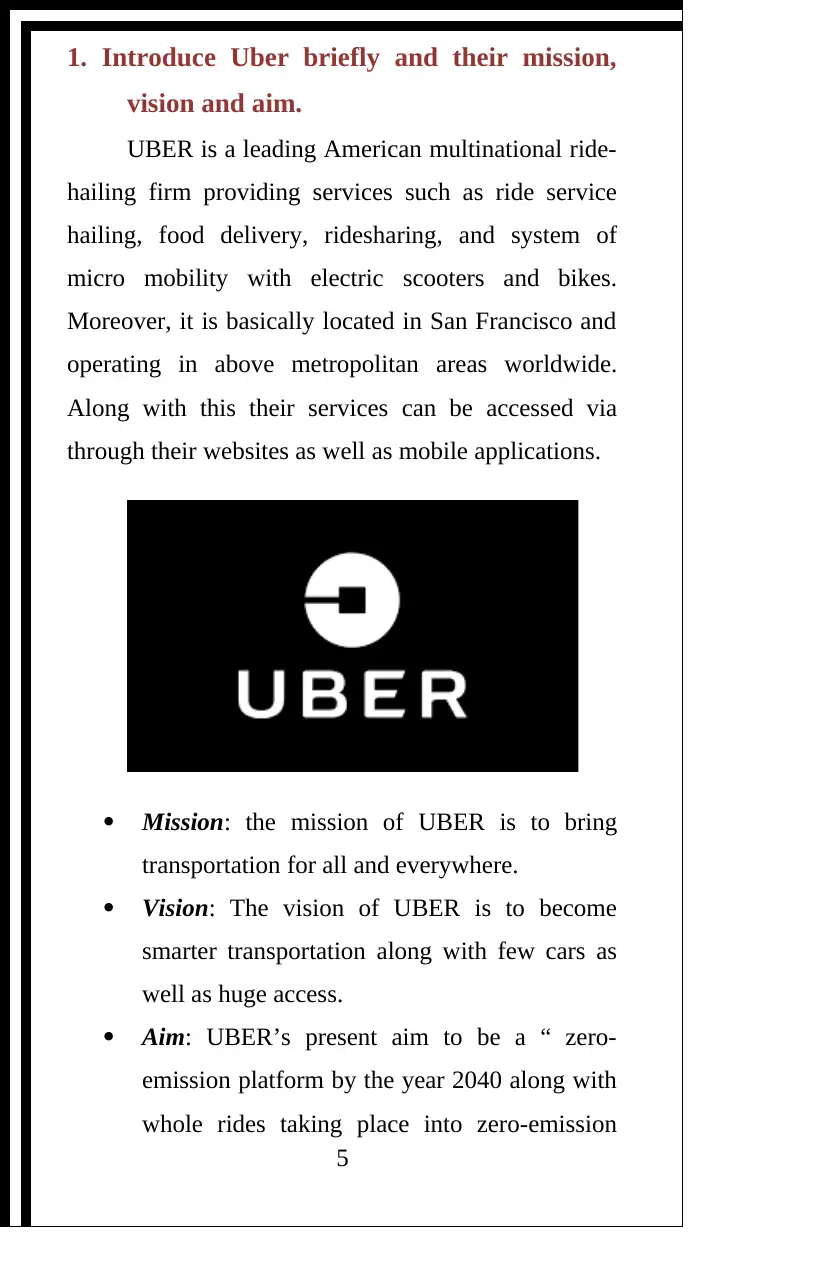
1. Introduce Uber briefly and their mission,
vision and aim.
UBER is a leading American multinational ride-
hailing firm providing services such as ride service
hailing, food delivery, ridesharing, and system of
micro mobility with electric scooters and bikes.
Moreover, it is basically located in San Francisco and
operating in above metropolitan areas worldwide.
Along with this their services can be accessed via
through their websites as well as mobile applications.
Mission: the mission of UBER is to bring
transportation for all and everywhere.
Vision: The vision of UBER is to become
smarter transportation along with few cars as
well as huge access.
Aim: UBER’s present aim to be a “ zero-
emission platform by the year 2040 along with
whole rides taking place into zero-emission
5
vision and aim.
UBER is a leading American multinational ride-
hailing firm providing services such as ride service
hailing, food delivery, ridesharing, and system of
micro mobility with electric scooters and bikes.
Moreover, it is basically located in San Francisco and
operating in above metropolitan areas worldwide.
Along with this their services can be accessed via
through their websites as well as mobile applications.
Mission: the mission of UBER is to bring
transportation for all and everywhere.
Vision: The vision of UBER is to become
smarter transportation along with few cars as
well as huge access.
Aim: UBER’s present aim to be a “ zero-
emission platform by the year 2040 along with
whole rides taking place into zero-emission
5
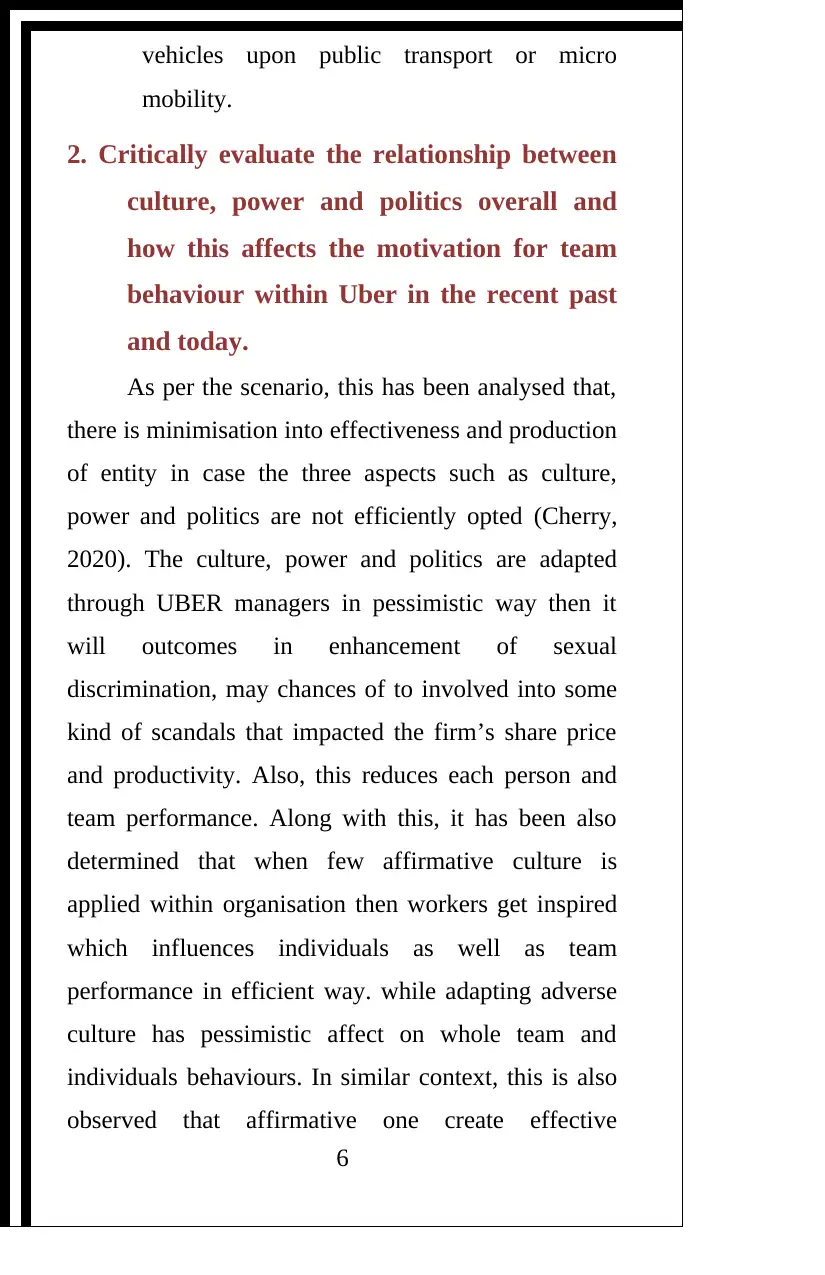
vehicles upon public transport or micro
mobility.
2. Critically evaluate the relationship between
culture, power and politics overall and
how this affects the motivation for team
behaviour within Uber in the recent past
and today.
As per the scenario, this has been analysed that,
there is minimisation into effectiveness and production
of entity in case the three aspects such as culture,
power and politics are not efficiently opted (Cherry,
2020). The culture, power and politics are adapted
through UBER managers in pessimistic way then it
will outcomes in enhancement of sexual
discrimination, may chances of to involved into some
kind of scandals that impacted the firm’s share price
and productivity. Also, this reduces each person and
team performance. Along with this, it has been also
determined that when few affirmative culture is
applied within organisation then workers get inspired
which influences individuals as well as team
performance in efficient way. while adapting adverse
culture has pessimistic affect on whole team and
individuals behaviours. In similar context, this is also
observed that affirmative one create effective
6
mobility.
2. Critically evaluate the relationship between
culture, power and politics overall and
how this affects the motivation for team
behaviour within Uber in the recent past
and today.
As per the scenario, this has been analysed that,
there is minimisation into effectiveness and production
of entity in case the three aspects such as culture,
power and politics are not efficiently opted (Cherry,
2020). The culture, power and politics are adapted
through UBER managers in pessimistic way then it
will outcomes in enhancement of sexual
discrimination, may chances of to involved into some
kind of scandals that impacted the firm’s share price
and productivity. Also, this reduces each person and
team performance. Along with this, it has been also
determined that when few affirmative culture is
applied within organisation then workers get inspired
which influences individuals as well as team
performance in efficient way. while adapting adverse
culture has pessimistic affect on whole team and
individuals behaviours. In similar context, this is also
observed that affirmative one create effective
6
⊘ This is a preview!⊘
Do you want full access?
Subscribe today to unlock all pages.

Trusted by 1+ million students worldwide
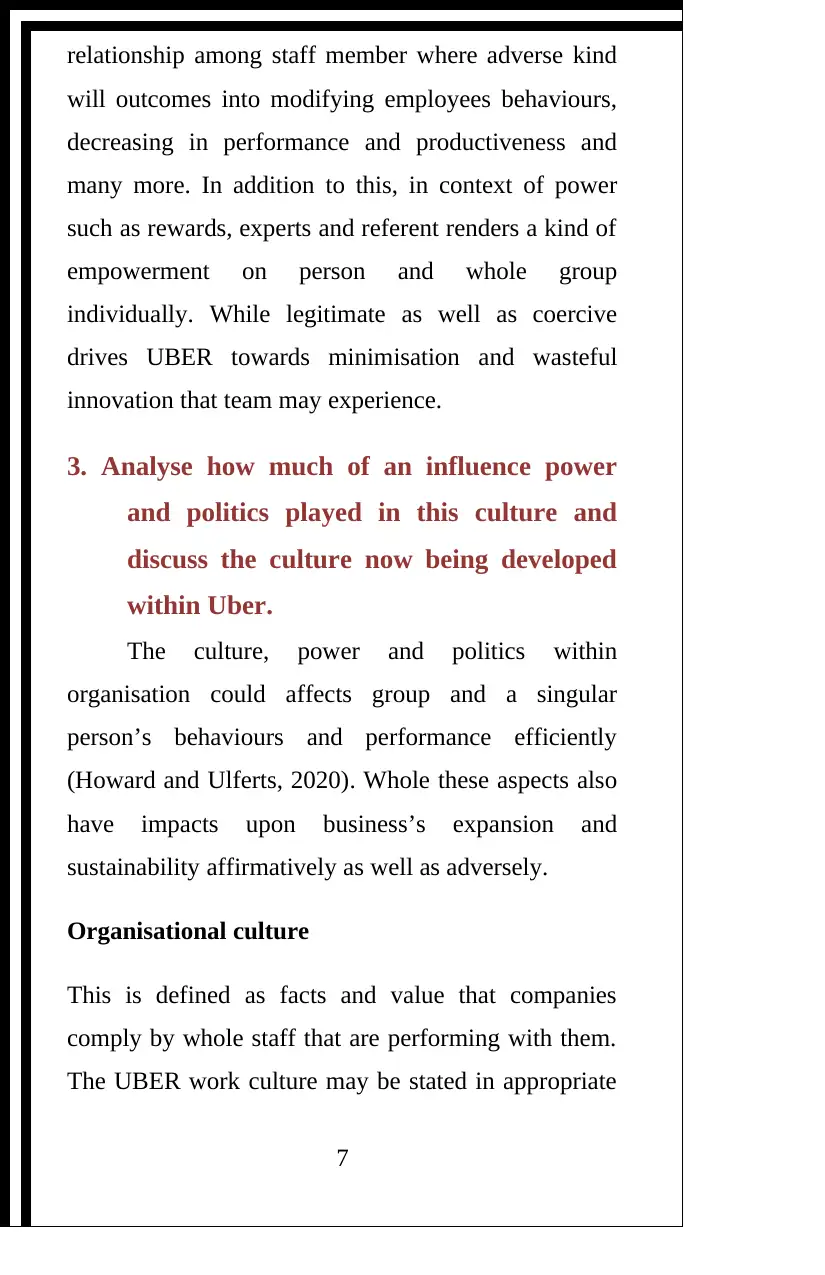
relationship among staff member where adverse kind
will outcomes into modifying employees behaviours,
decreasing in performance and productiveness and
many more. In addition to this, in context of power
such as rewards, experts and referent renders a kind of
empowerment on person and whole group
individually. While legitimate as well as coercive
drives UBER towards minimisation and wasteful
innovation that team may experience.
3. Analyse how much of an influence power
and politics played in this culture and
discuss the culture now being developed
within Uber.
The culture, power and politics within
organisation could affects group and a singular
person’s behaviours and performance efficiently
(Howard and Ulferts, 2020). Whole these aspects also
have impacts upon business’s expansion and
sustainability affirmatively as well as adversely.
Organisational culture
This is defined as facts and value that companies
comply by whole staff that are performing with them.
The UBER work culture may be stated in appropriate
7
will outcomes into modifying employees behaviours,
decreasing in performance and productiveness and
many more. In addition to this, in context of power
such as rewards, experts and referent renders a kind of
empowerment on person and whole group
individually. While legitimate as well as coercive
drives UBER towards minimisation and wasteful
innovation that team may experience.
3. Analyse how much of an influence power
and politics played in this culture and
discuss the culture now being developed
within Uber.
The culture, power and politics within
organisation could affects group and a singular
person’s behaviours and performance efficiently
(Howard and Ulferts, 2020). Whole these aspects also
have impacts upon business’s expansion and
sustainability affirmatively as well as adversely.
Organisational culture
This is defined as facts and value that companies
comply by whole staff that are performing with them.
The UBER work culture may be stated in appropriate
7
Paraphrase This Document
Need a fresh take? Get an instant paraphrase of this document with our AI Paraphraser
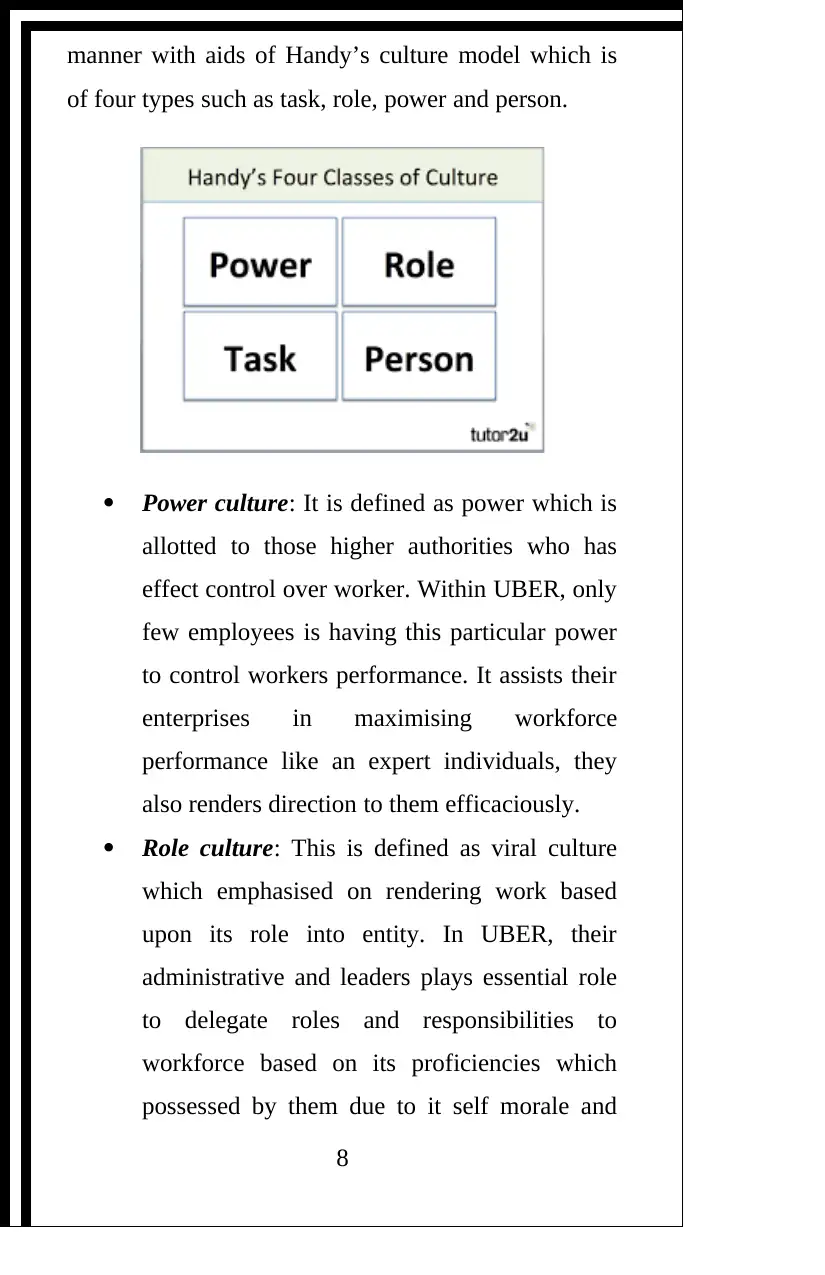
manner with aids of Handy’s culture model which is
of four types such as task, role, power and person.
Power culture: It is defined as power which is
allotted to those higher authorities who has
effect control over worker. Within UBER, only
few employees is having this particular power
to control workers performance. It assists their
enterprises in maximising workforce
performance like an expert individuals, they
also renders direction to them efficaciously.
Role culture: This is defined as viral culture
which emphasised on rendering work based
upon its role into entity. In UBER, their
administrative and leaders plays essential role
to delegate roles and responsibilities to
workforce based on its proficiencies which
possessed by them due to it self morale and
8
of four types such as task, role, power and person.
Power culture: It is defined as power which is
allotted to those higher authorities who has
effect control over worker. Within UBER, only
few employees is having this particular power
to control workers performance. It assists their
enterprises in maximising workforce
performance like an expert individuals, they
also renders direction to them efficaciously.
Role culture: This is defined as viral culture
which emphasised on rendering work based
upon its role into entity. In UBER, their
administrative and leaders plays essential role
to delegate roles and responsibilities to
workforce based on its proficiencies which
possessed by them due to it self morale and
8
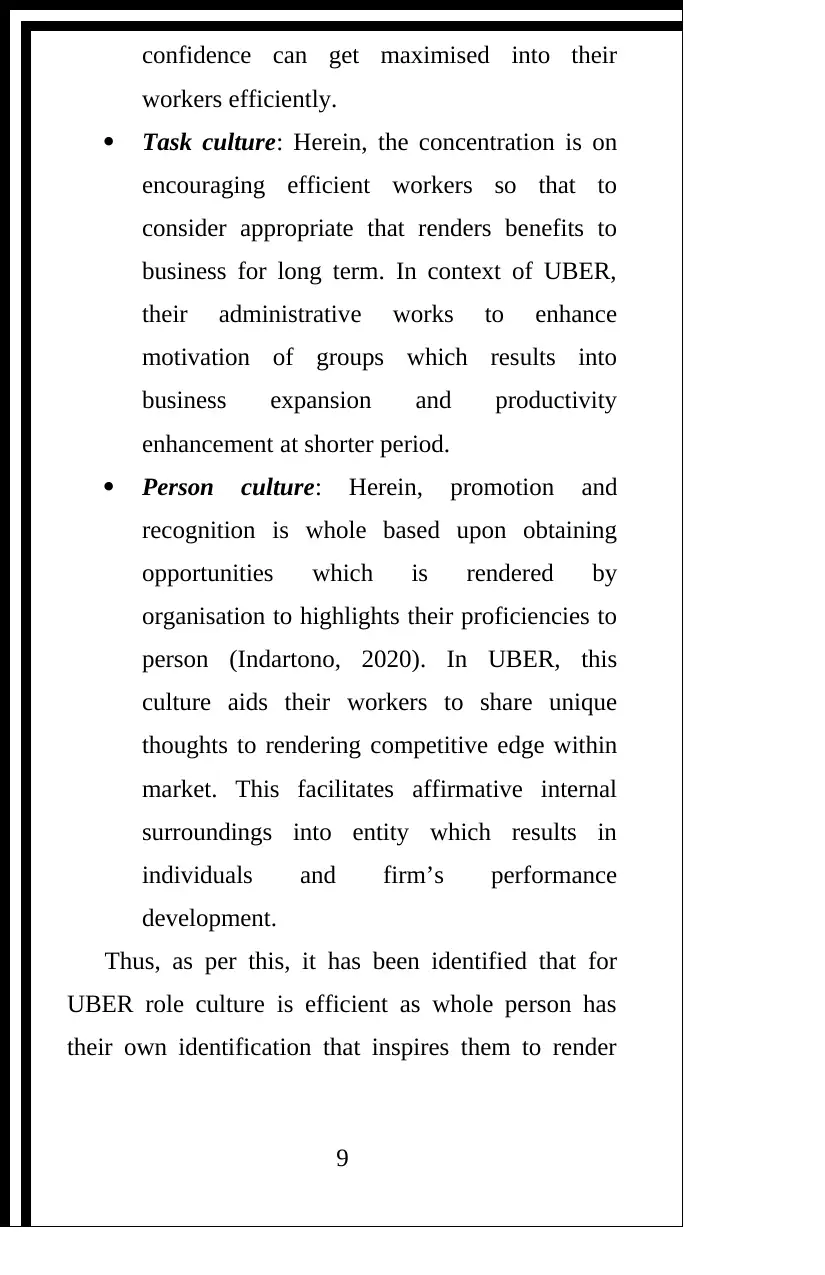
confidence can get maximised into their
workers efficiently.
Task culture: Herein, the concentration is on
encouraging efficient workers so that to
consider appropriate that renders benefits to
business for long term. In context of UBER,
their administrative works to enhance
motivation of groups which results into
business expansion and productivity
enhancement at shorter period.
Person culture: Herein, promotion and
recognition is whole based upon obtaining
opportunities which is rendered by
organisation to highlights their proficiencies to
person (Indartono, 2020). In UBER, this
culture aids their workers to share unique
thoughts to rendering competitive edge within
market. This facilitates affirmative internal
surroundings into entity which results in
individuals and firm’s performance
development.
Thus, as per this, it has been identified that for
UBER role culture is efficient as whole person has
their own identification that inspires them to render
9
workers efficiently.
Task culture: Herein, the concentration is on
encouraging efficient workers so that to
consider appropriate that renders benefits to
business for long term. In context of UBER,
their administrative works to enhance
motivation of groups which results into
business expansion and productivity
enhancement at shorter period.
Person culture: Herein, promotion and
recognition is whole based upon obtaining
opportunities which is rendered by
organisation to highlights their proficiencies to
person (Indartono, 2020). In UBER, this
culture aids their workers to share unique
thoughts to rendering competitive edge within
market. This facilitates affirmative internal
surroundings into entity which results in
individuals and firm’s performance
development.
Thus, as per this, it has been identified that for
UBER role culture is efficient as whole person has
their own identification that inspires them to render
9
⊘ This is a preview!⊘
Do you want full access?
Subscribe today to unlock all pages.

Trusted by 1+ million students worldwide
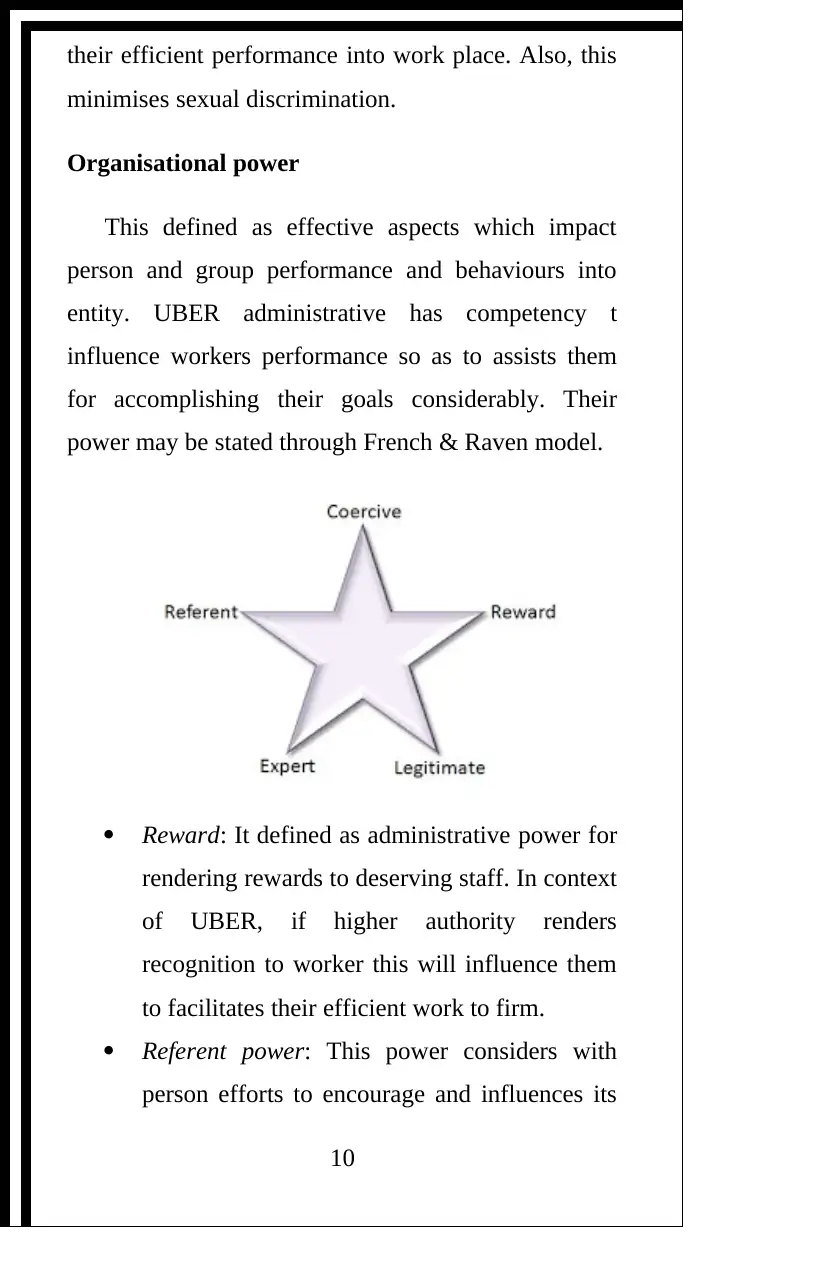
their efficient performance into work place. Also, this
minimises sexual discrimination.
Organisational power
This defined as effective aspects which impact
person and group performance and behaviours into
entity. UBER administrative has competency t
influence workers performance so as to assists them
for accomplishing their goals considerably. Their
power may be stated through French & Raven model.
Reward: It defined as administrative power for
rendering rewards to deserving staff. In context
of UBER, if higher authority renders
recognition to worker this will influence them
to facilitates their efficient work to firm.
Referent power: This power considers with
person efforts to encourage and influences its
10
minimises sexual discrimination.
Organisational power
This defined as effective aspects which impact
person and group performance and behaviours into
entity. UBER administrative has competency t
influence workers performance so as to assists them
for accomplishing their goals considerably. Their
power may be stated through French & Raven model.
Reward: It defined as administrative power for
rendering rewards to deserving staff. In context
of UBER, if higher authority renders
recognition to worker this will influence them
to facilitates their efficient work to firm.
Referent power: This power considers with
person efforts to encourage and influences its
10
Paraphrase This Document
Need a fresh take? Get an instant paraphrase of this document with our AI Paraphraser
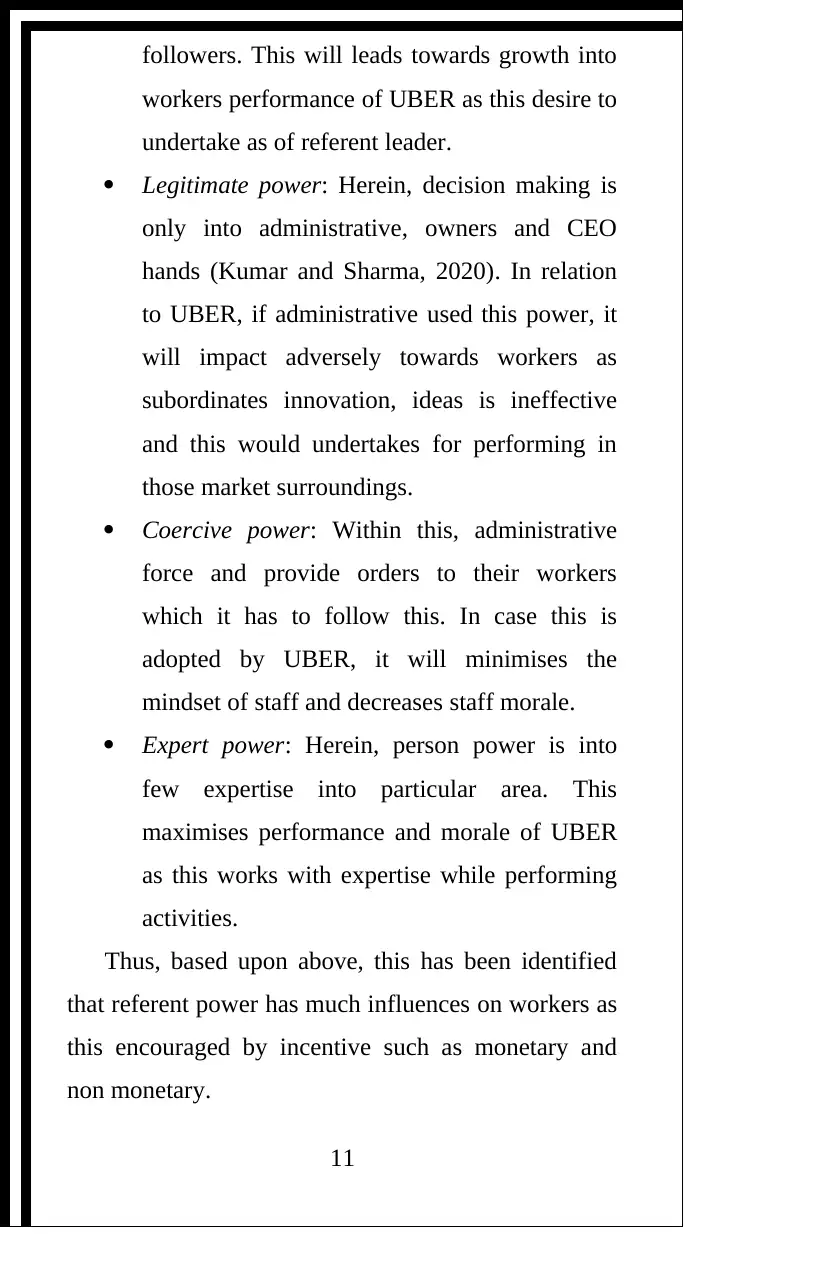
followers. This will leads towards growth into
workers performance of UBER as this desire to
undertake as of referent leader.
Legitimate power: Herein, decision making is
only into administrative, owners and CEO
hands (Kumar and Sharma, 2020). In relation
to UBER, if administrative used this power, it
will impact adversely towards workers as
subordinates innovation, ideas is ineffective
and this would undertakes for performing in
those market surroundings.
Coercive power: Within this, administrative
force and provide orders to their workers
which it has to follow this. In case this is
adopted by UBER, it will minimises the
mindset of staff and decreases staff morale.
Expert power: Herein, person power is into
few expertise into particular area. This
maximises performance and morale of UBER
as this works with expertise while performing
activities.
Thus, based upon above, this has been identified
that referent power has much influences on workers as
this encouraged by incentive such as monetary and
non monetary.
11
workers performance of UBER as this desire to
undertake as of referent leader.
Legitimate power: Herein, decision making is
only into administrative, owners and CEO
hands (Kumar and Sharma, 2020). In relation
to UBER, if administrative used this power, it
will impact adversely towards workers as
subordinates innovation, ideas is ineffective
and this would undertakes for performing in
those market surroundings.
Coercive power: Within this, administrative
force and provide orders to their workers
which it has to follow this. In case this is
adopted by UBER, it will minimises the
mindset of staff and decreases staff morale.
Expert power: Herein, person power is into
few expertise into particular area. This
maximises performance and morale of UBER
as this works with expertise while performing
activities.
Thus, based upon above, this has been identified
that referent power has much influences on workers as
this encouraged by incentive such as monetary and
non monetary.
11
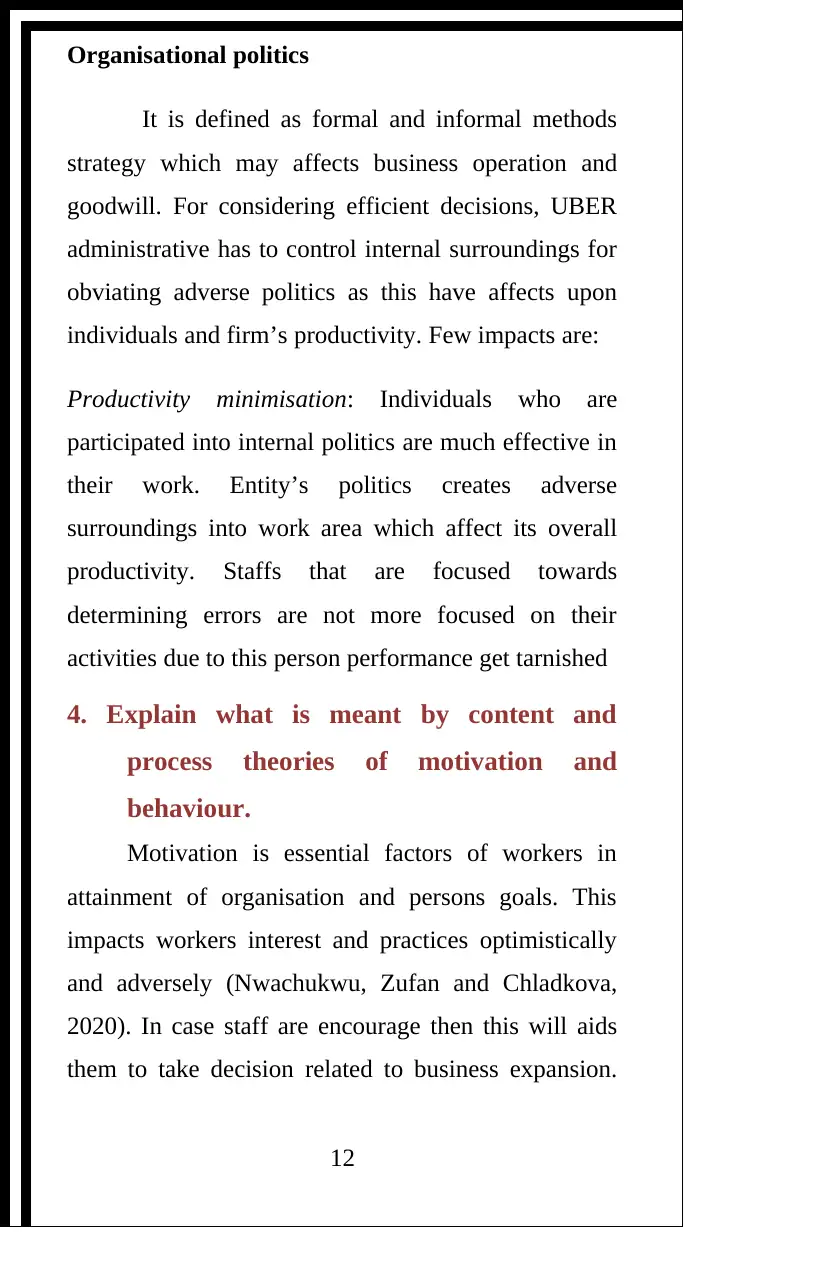
Organisational politics
It is defined as formal and informal methods
strategy which may affects business operation and
goodwill. For considering efficient decisions, UBER
administrative has to control internal surroundings for
obviating adverse politics as this have affects upon
individuals and firm’s productivity. Few impacts are:
Productivity minimisation: Individuals who are
participated into internal politics are much effective in
their work. Entity’s politics creates adverse
surroundings into work area which affect its overall
productivity. Staffs that are focused towards
determining errors are not more focused on their
activities due to this person performance get tarnished
4. Explain what is meant by content and
process theories of motivation and
behaviour.
Motivation is essential factors of workers in
attainment of organisation and persons goals. This
impacts workers interest and practices optimistically
and adversely (Nwachukwu, Zufan and Chladkova,
2020). In case staff are encourage then this will aids
them to take decision related to business expansion.
12
It is defined as formal and informal methods
strategy which may affects business operation and
goodwill. For considering efficient decisions, UBER
administrative has to control internal surroundings for
obviating adverse politics as this have affects upon
individuals and firm’s productivity. Few impacts are:
Productivity minimisation: Individuals who are
participated into internal politics are much effective in
their work. Entity’s politics creates adverse
surroundings into work area which affect its overall
productivity. Staffs that are focused towards
determining errors are not more focused on their
activities due to this person performance get tarnished
4. Explain what is meant by content and
process theories of motivation and
behaviour.
Motivation is essential factors of workers in
attainment of organisation and persons goals. This
impacts workers interest and practices optimistically
and adversely (Nwachukwu, Zufan and Chladkova,
2020). In case staff are encourage then this will aids
them to take decision related to business expansion.
12
⊘ This is a preview!⊘
Do you want full access?
Subscribe today to unlock all pages.

Trusted by 1+ million students worldwide
1 out of 21
Related Documents
Your All-in-One AI-Powered Toolkit for Academic Success.
+13062052269
info@desklib.com
Available 24*7 on WhatsApp / Email
![[object Object]](/_next/static/media/star-bottom.7253800d.svg)
Unlock your academic potential
Copyright © 2020–2026 A2Z Services. All Rights Reserved. Developed and managed by ZUCOL.





